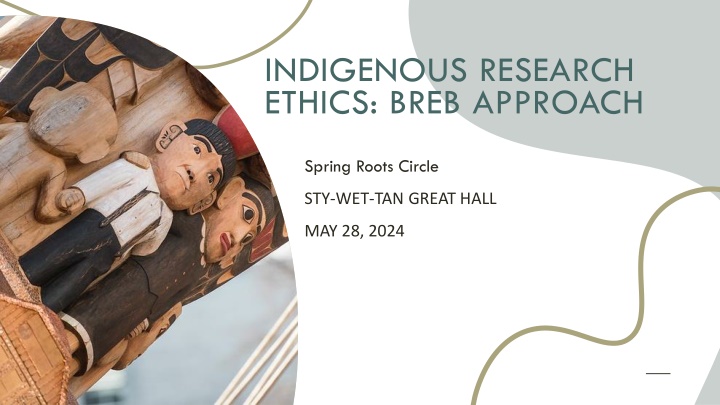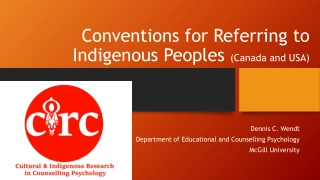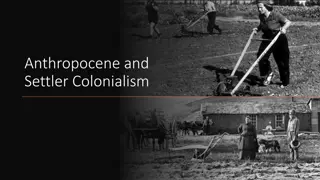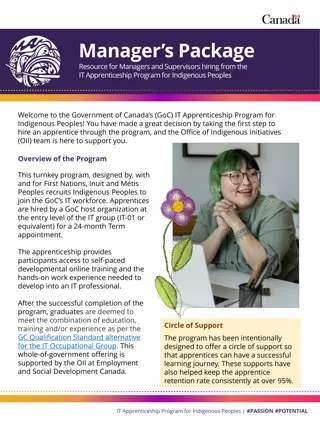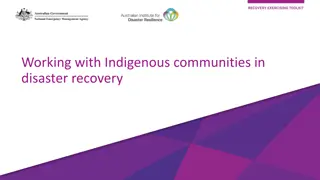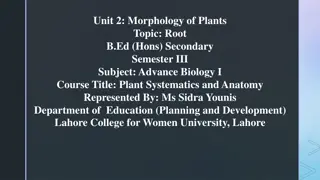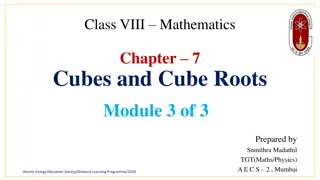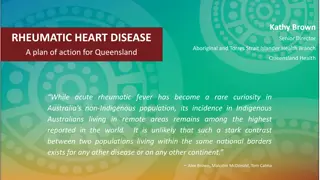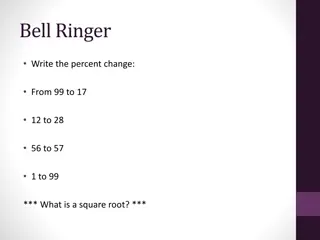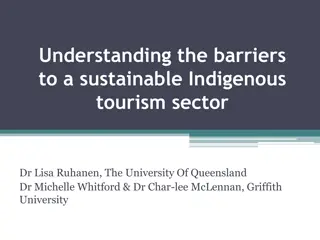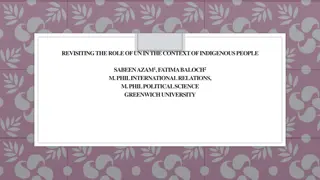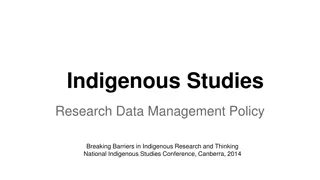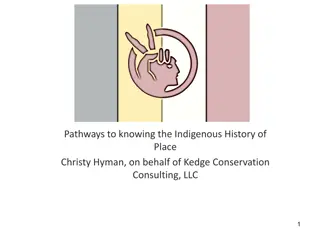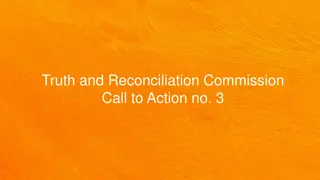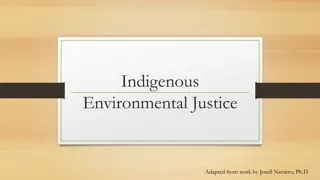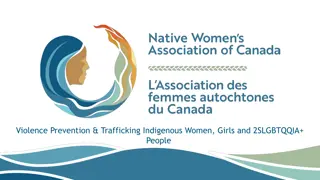Indigenous Research Ethics and BREB Approach at Spring Roots Circle
This content delves into Indigenous research ethics and the BREB approach, emphasizing the importance of respecting diverse perspectives and aligning initiatives. It covers the mandates of the Behavioural Research Ethics Board and provides resources for designing ethical research practices. Learn about TCPS2 guidelines, CORE principles, and the role of the BREB in overseeing research at academic institutions in Canada and beyond.
Download Presentation

Please find below an Image/Link to download the presentation.
The content on the website is provided AS IS for your information and personal use only. It may not be sold, licensed, or shared on other websites without obtaining consent from the author.If you encounter any issues during the download, it is possible that the publisher has removed the file from their server.
You are allowed to download the files provided on this website for personal or commercial use, subject to the condition that they are used lawfully. All files are the property of their respective owners.
The content on the website is provided AS IS for your information and personal use only. It may not be sold, licensed, or shared on other websites without obtaining consent from the author.
E N D
Presentation Transcript
INDIGENOUS RESEARCH ETHICS: BREB APPROACH Spring Roots Circle STY-WET-TAN GREAT HALL MAY 28, 2024
THANK YOU Wendy Bond Research Ethics Project Officer Office Of Research Ethics | VPRI wendy.bond@ubc.ca https://researchethics.ubc.ca/behavioural- research-ethics/indigenous-research-and- ethics-review
Hopes for this session 1. Information is useful to the diversity of audience members/perspectives 2. Recognize other initiatives that are aligned with our Project 3. Invite more conversation and your involvement in the work we are doing 4. Serendipity
BREB (Behavioural Research Ethics Board) NSERC SSHRC CIHR Natural Sciences and Engineering Research Council of Canada Social Sciences and Humanities Research Council Tri-Council (CIHR NSERC SSHRC) mandates the ethical conduct of research in Canada o TCPS2 2022 | https://bit.ly/TCPS-2 o CORE Principles: Respect for Persons | Concern for Welfare | Justice o Chapter 9 | Research Involving the First Nations, Inuit and M tis Peoples of Canada Cdn Institutes of Health Research TCPS2 Tri-Council Policy Statement on the Ethical Conduct of Research Involving Humans CORE Tutorial University Council develops policy in alignment with TCPS2 UBC Policy SC6: Scholarly Integrity LR2: Research BREB develops guidance that aligns with TCPS2 and university policy o Reviews and approves all social sciences research conducted under the auspices of UBC (funded & unfunded) involving UBC researchers o Includes studies about health where the goal is not to modify direct patient clinical care o Includes research at UBC involving other institutions (e.g., health authorities, other Canadian and international universities) LR9: Research and Other Studies Involving Human Subjects SC3: Conflict of Interest BREB (VCR & OK) Behavioural Research Ethics Board Guidance + Standard Operating Procedures (SOPs) 4
Links to research ethics resources Most behavioural research ethics content comes in the form of guidance documents that address specific topics. Office of Research Ethics (ORE) role https://researchethics.ubc.ca/about-human-research-ethics How to reach BREB staff https://researchethics.ubc.ca/behavioural-research-ethics/contact-breb Contact details for other UBC and affiliated REBs (e.g., Children s and Women s, BC Cancer, etc.) https://researchethics.ubc.ca/about-human-research-ethics/contact-us Things to think about while designing your research | participant inclusion, ensuring consent, ethical issues arising from research methods, using social media, institutional ethics review is needed https://researchethics.ubc.ca/behavioural-research-ethics/ethical-considerations- research-design Who sits on the BREB https://researchethics.ubc.ca/behavioural-research-ethics/breb-meeting-dates- deadlines About BREB review of Indigenous research https://researchethics.ubc.ca/behavioural-research-ethics/indigenous-research-and- ethics-review Policy that covers all research conducted at academic institutions in Canada https://ethics.gc.ca/eng/policy-politique_tcps2-eptc2_2022.html Policy in the US (Office for Human Research Protections) https://www.hhs.gov/ohrp/index.html 5
BREB and the Indigenous Strategic Plan 1. Completed BREB Self-Evaluation (ISI Tool) 2. Identify UBC-ISP goals and actions 3. Build placeholder webpage to mitigate lack of transparency around BREB review practices. https://bit.ly/UBC-BREB 4. Establish Working Group 5. Set Years 1 & 2 priorities: a. Training in cultural sensitivity (starting point) for BREB members: Sany as or equivalent, completed by August 2023 b. Full-day retreat for BREB members on ethics review of Indigenous research (June 2023) c. Review and refine BREB ethics review practices d. Ongoing consultations with researchers on Indigenous-focused BREB applications in support of the above e. Design and build Indigenous Research Ethics Repository: (Indigenous Strategic Initiative funded) 5
BREB Working Group Working Group 2021 - 2023 Marilyn van Bibber | Selkirk First Nation | BREB Community Member Jude Kornelsen | BREB Faculty Member, Centre for Rural Health Research Grant Charles | BREB Faculty Member, School of Social Work Jean Ruiz | Office of Research Ethics (ORE) Wendy Bond | ORE & Project Lead Added 2024 Asma-na-hi Antoine | Toquaht Nation | BREB Community Member & SFU PhD candidate Dustin Louie | Nee Tahi Buhn Nation | BREB member Hanna Paul | Metis | UBC-Okanagan Indigenous Research Facilitator Taban Behin | Manager, Research and Ethics, First Nations Health Authority 5
Roots Circle Learning Goals (from registration feedback) Indigenous Research Ethics Repository Project Questions What it means to be a good partner & how to approach partnership in a good way How can/should researchers ensure and demonstrate that they are giving back to the communities who contribute to their research? Indigenous research methodologies What is needed to ensure that researchers conduct themselves ethically during research planning, implementations and after dissemination? How to uplift Indigenous knowledge in the UBC setting What role can the research ethics board play in ensuring that ethical Indigenous research practices and protocols are upheld by researchers (e.g., OCAP principles)? Knowledge translation practices How does the goal of achieving reciprocity factor into the design and implementation of Indigenous research projects? How communities are leading their own research What should/could the Behavioural Research Ethics Board s role be in reviewing/approving community-led research? Demystifying research processes o What processes can and should be changed to remove barriers? o Where are the gaps in understanding of existing processes? o What new information/supports are needed? o How can processes and tools be most effectively delivered? https://researchethics.ubc.ca/behavioural-research-ethics/indigenous-research-and-ethics-review 6
Indigenous Research Ethics Repository Sample Themes Ethical principles in Indigenous research Relationship building Informed consent Community-involved/ led research Reciprocity through research and dissemination Etc. UBC REB ICCOs Students, Researchers & Staff Indigenous Communities, Collectives & Organizations Research Ethics Board Members & Staff Links to available, validated resources from across the web About: Indigenous research, research ethics, research protocols (national/global) Searchable by: topic, theme, user profile 7
Indigenous Faculty Interviews Who: Indigenous UBC Faculty who have experience submitting to the Behavioural Research Ethics Board at UBC-Vancouver Sample Interview Questions 1. How do you think about ethics in your Indigenous research projects? 2. What are the most important components of conducting research ethically? 3. When you submit an ethics application, what would you want the REB to know about you? 4. Were you able to explain your research approach and values during your institutional research ethics process? 5. Were the questions in the application appropriate? If not, what would you change? 6. As a supervisor of students doing research, what challenges have you encountered? Is there anything the ORE could potentially help with? 7. In a perfect world, what would Indigenous research ethics review look like? Interviewer/s: Yotakahron Jonathan, with Wendy Bond Areas of Research Contemporary Indigenous Feminism Critical Indigenous Studies Early Childhood Education Education & Pedagogy English Literature Geography Linguistics Oceans & Fisheries Sociology 8
Common Themes / Ethical Concerns 1. Value of face-to-face meetings: BREB with research team / with community partners 2. Over-emphasis on legalistic requirements at the expense of recognition for Indigenous values (relationship, respect, accountability) 3. REB review should be a conversation between researcher and reviewer, but often comes across as punitive, judgmental 4. Lack of clarity in the ethics application about what information is being sought 5. Perception of an underlying message that there is one right way to conduct research 6. Agreement that the research ethics review process adds value to the quality of research 7. Verification process is lacking for researcher accountability to community partners 9
Next Steps Working Group 1. Review current BREB Ethics application process with critical lens and propose alternatives 2. Develop new guidance to address gaps in information 3. Develop new practices for supporting Indigenous research undertakings 4. Develop training and support materials for Behavioural REB reviewers 5. Evaluate and recommend resources for the Indigenous Research Ethics Repository 6. Relaunch (postponed) Indigenous Student Circle (as resources allow) Repository 1. Build repository structure based on "three pillars" approach Researchers | ICCOs | Ethics Reviewers 2. Continue developing relationships with and seek input from First Nations and Indigenous Communities 3. Continue building inventory of (validated) resources for delivery through repository 10
Choose a group topic (or come up with your own) 1. Defining ethics What does ethics mean to you? Where do you see ethics in your work? What questions do you have when it comes to ethics? 2. Building good relations with/through research activities What are the fundamental values you bring to your research project? What does relationality have to do with research ethics? 11
